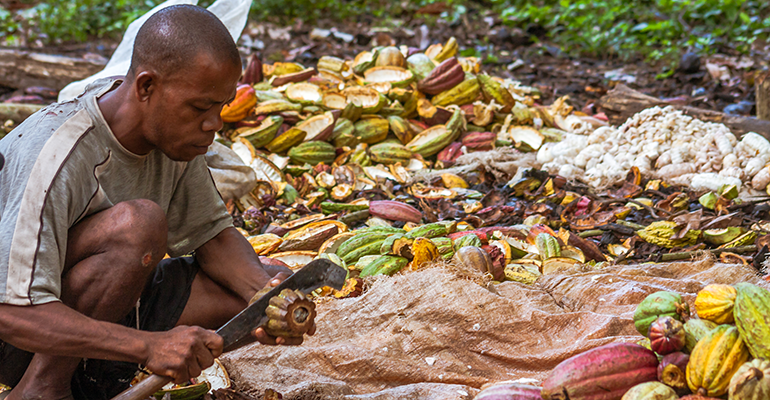News
CS3D approval raises hopes of better tackling child labour in the cocoa industry
31 May 2024The EU has given the green light to the Corporate Sustainability Due Diligence Directive (CS3D), impacting the entire value chain, including the cocoa and chocolate industry.
The directive, approved on 24 May 2024 by the Council of the European Union, has been a long time coming. Now ratified, the entire cocoa supply chain will have to get to grips with tougher rules that emphasise a greater level of transparency.

In a nutshell, the directive means that companies will be obliged to identify and address any negative impact from their business on the environment or human rights throughout the supply chain. Sarah Dekkiche, International Cocoa Initiative (ICI) director of policy and partnerships explains what all this means to the cocoa industry.
Implementation should happen as of mid-2027
“The timeline for this directive has changed many times, but now EU Member States will provide the last step for the approval in Council at the end of May. Following this, the directive will be published in full in the EU Official Journal in mid-June, and will then be implemented as of mid-2027,” said Dekkiche.
Dekkiche explained that the legislation is the same for all companies in scope, meaning that every aspect of the cocoa supply chain has to be accounted for to ensure they comply with environmental and child labour standards. As ICI is focused on addressing child labour in West Africa, supporting the practical implementation of the legislation will be one of the key areas of the organisation’s work.
“If you want to identify your risk, you have to have an enhanced understanding of your supply chain by maximising its traceability. We know that child labour and forced labour are among the most significant human rights issues in the cocoa sector, so the directive makes it an imperative that manufacturers know what is going on with respect to this,” said Dekkiche.
“For cocoa and chocolate companies, this means they have to identify problems relating to labour issues and implement the right interventions to remedy the problems. Today many chocolate and cocoa companies are already implementing Child Labour Monitoring and Remediation Systems (CLMRS). One implication of this new legislation is to strengthen these systems, meaning to make them more efficient and to scale them-up to cover all cocoa-producing households.”
Larger chocolate players will be directly impacted by the legislation
The ICI works with some of the biggest chocolate and cocoa manufacturers in the world, including names like Cargill, Barry Callebaut, Unilever, Marks & Spencer, Nestlé, Ferrero and Hershey. Dekkiche explained that the legislation targets these larger-scale manufacturers directly, while smaller companies are not directly impacted.
“However, because of the expectation to conduct due diligence across the full supply chain, smaller companies are indirectly impacted by the changes through their business relationships with larger companies,” Dekkiche added.
“The legislation is an opportunity to enhance responsible business conduct in general, encouraging sustainable purchasing practices and a better income for farmers, helping them out of poverty. This is also something that benefits chocolate manufacturers, as they are required to communicate about their human rights due diligence efforts and the impact these measures are having on cocoa farming communities.”
The long-term goal is improved human rights
When it comes to the long-term goal of the CS3D legislation, ICI has a firm goal of ensuring that there are fewer human rights violations in the cocoa supply chain and that the cocoa and chocolate products that consumers buy are as ethically produced as possible.
“Moving forward, the big challenge is that the legislation is very new, so there will be a lot of new questions to address, namely competent authorities if Member States will have to interpret what it means in practice. Indeed, individual courts in Member States will have to be able to judge whether or not a company has or has not done appropriate human rights (and environmental) due diligence” explained Dekkiche.
“When you build and define a new law that has never existed before, there is always a period of time required to fully determine the jurisprudence. But at the beginning companies will probably face a certain amount of grey area as Member States define it at the national level.”
Related news

Allergen-friendly product launches are on the rise
23 May 2024
Amid Allergy Awareness Week and the growing number of consumers with allergies and sensitivities, manufacturers are increasingly exploring free-from product launches.
Read more
Children’s food and drink claims centre on health and wellness
1 May 2024
A new report by HealthFocus International shows parents are at the forefront of health and wellness trends, leading the way for packaging claims on children’s products.
Read more
Balenti adds the benefits of baobab to functional nut butters
19 Apr 2024
French startup Balenti uses sustainably sourced, wild-harvested baobab fruit to make its healthy nut butters with functional benefits.
Read more
Limiting trans fats in Kenyan food products could prevent heart disease
4 Apr 2024
Implementing trans fat restrictions in Kenya could bring about significant health and economic benefits, saving lives and reducing healthcare costs, study finds.
Read more
Cocoa prices likely to increase significantly in 2024
27 Mar 2024
Due to environmental factors, the International Cocoa Organization predicts an 11% drop in global cocoa output, driving cocoa prices up and raising concerns for farmers' livelihoods.
Read more
Ultra-processed food intake in South Africa at concerning levels, study suggests
19 Mar 2024
As South Africa considers introducing front-of-pack warning labels and strict marketing limits for unhealthy foods, research has found that low-income South Africans get around half of their calories from ultra-processed foods (UPFs) – “a cause for con...
Read more
Sainsbury’s reaches living wage goal for banana workers
12 Mar 2024
UK supermarket Sainsbury’s announces it has achieved its industry commitment three years ahead of schedule and encourages other retailers to do the same.
Read more